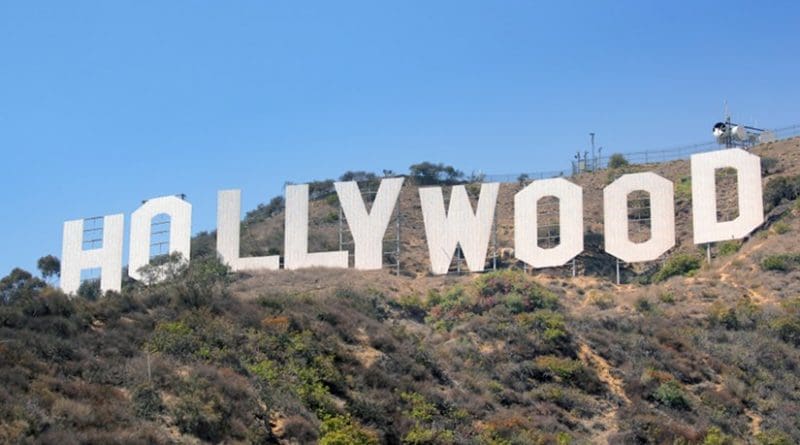How Hollywood Movies Define US Policies – OpEd
By Ray Hanania
The battle between the biased US news media and President Donald Trump was not the only thing on the minds of Americans during these past few weeks. Nearly 20 million of them went to theaters to watch “Patriots Day,” a dramatization of how two Chechen Muslims killed four Americans and injured hundreds during a five-day terror campaign that began at the Boston Marathon on April 15, 2013.
Although the 143-minute movie vaguely presented some of the motives of the two bombers, brothers Dzhokhar and Tamerlan Tsarnaev, the focus was on the suffering of the victims and the people involved in capturing them. In the end, the film brought American audiences together against terrorism by Muslims. It was a very emotional film, only one of a dozen movies that define Arab and Muslim terrorism against Americans.
Movies like this strengthen US resolve against terrorism while reinforcing stereotypes, such as the false notion that terrorism only occurs when an Arab or Muslim kills American civilians. Most Americans do not consider it terrorism when an American or an ally such as Israel kills Arabs or Muslims.
The movie cost $45 million to make, funded by 19 people including actor Mark Wahlberg, who served as an executive producer.
Why have the Arab and Muslim worlds not presented their hundreds of “Boston Marathon bombings” to Americans through film? Do we not have the talent to tell our stories? Do we not have stories to tell? That is what some Americans might think when they see nothing from us. Hundreds of similar stories can be told, stories that can significantly alter the American view of Arabs, Muslims, and causes such as Palestine and Syrian refugees.
Occupied Palestine is a litany of untold stories that can be turned into powerful and compelling movies. Gaza alone would be a movie series of Israeli carnage and violence. Yet none of their stories have been told through movie production. Despite the propaganda, the violence is not caused by Palestinians firing Qassam rockets erratically at Israel. It is caused by Israelis who frequently attack and kill civilians.
Are the four people who died in Boston any more deserving of attention than the thousands of Gaza civilians blown up by Israeli bombings? How about the story of Kafr Qasim, when terrorist Ariel Sharon ordered the murder in cold blood of dozens of Arab civilians who were returning to their homes in occupied Palestine in 1956? They were unaware that Israel had imposed a shoot-to-kill curfew. Among the 48 murdered were 23 children.
I would like to see a movie convey the horrific image of an Israeli soldier pointing his US-made gun at a six-year-old Arab child. Maybe a movie about Deir Yassin, when Menachem Begin and Yitzhak Shamir, both later Israeli prime ministers, ordered the massacre of 100 civilians. Years later, Israel expelled its Arab citizens, razed the village and built over it a memorial to Jews murdered during the Holocaust, Yad Vashem.
Maybe a movie about American Rachel Corrie, who was killed by an Israeli soldier driving a US-made D9 Caterpillar bulldozer who was destroying Arab civilian homes so they could expand an illegal Israeli settlement in 2003. Maybe a movie about Abdel Fattah Al-Sharif, the wounded Palestinian accused of attacking an Israeli soldier along with a friend at a checkpoint in occupied Hebron when they were shot.
As Al-Sharif was lying on the ground seriously wounded and unable to move, Israeli soldier Elor Azaria walked up to him and shot him in the head in cold blood. Azaria was charged and convicted of murder last week, but Israeli officials are already urging he be pardoned. We never would have known the facts had a courageous civil rights activist not videotaped the killing. That activist is now the target of an Israeli hate campaign and death threats.
Movies are a powerful means of convincing people of truths. Compelling movies can open closed minds, especially in the US, where for most Americans movies are their only education about Middle East events.
The Arab world could easily counter seven decades of Israeli propaganda and lies about Palestine, and stereotypes of Arabs and Muslims through just a couple of good films. One movie is far more effective than a dozen speeches at the UN or human rights reports, much of which most Americans will never see or hear.
Americans are not listening to the pleas of Arabs, Muslims and Palestinians. We are not telling our story to Americans. They cannot hear us. They only see us when we are presented to them as bloodthirsty terrorists, usually through movies. Many of the films are directly or indirectly financed by Israeli and pro-Israeli investors.
What is stopping us from telling our stories? Is it money? Wealthy Arabs and Muslims spend millions on luxury cars, spacious homes and extravagant vacations. I am not saying they do not deserve it, but can they not spend a fraction on making a movie that tells a powerful truth?
I remember in the 1960s when Hollywood released the movie “Exodus,” based on a novel by Leon Uris. The movie was filled with lies, exaggerations, distortions and obvious fiction, yet Americans embraced it as the definitive story of Israel.
We can achieve so much by producing our own films for US audiences that offer a compelling truth about who we are. We would not even lie, like the Israelis do. All we have to do is tell the truth. In the war between lies and truth, truth has no standing if it can never reach an audience. A few dollars can change all that.

